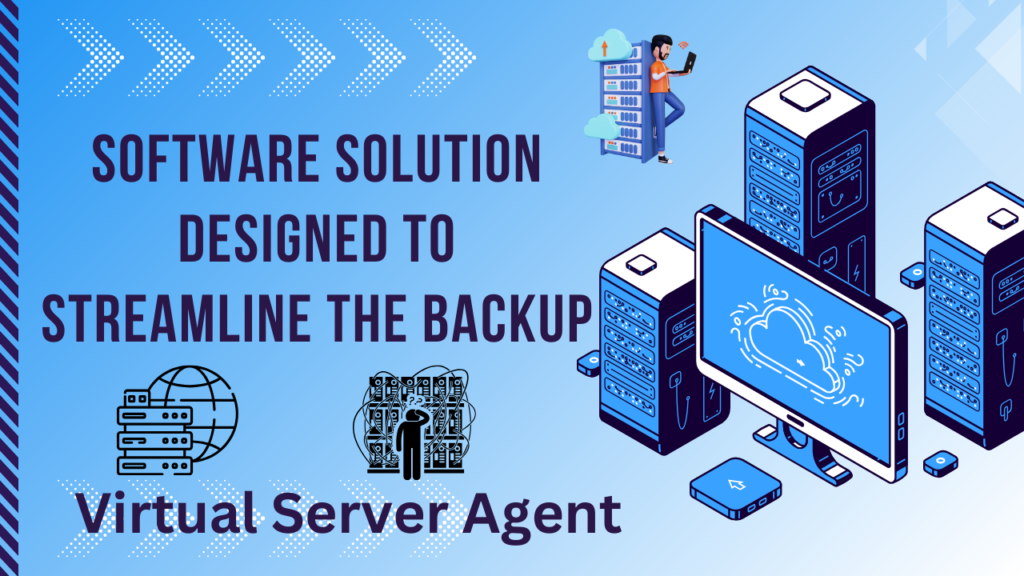In today’s digital landscape, where data reigns supreme, businesses are constantly seeking innovative solutions to manage and protect their valuable information assets. One such solution that has gained prominence in recent years is the Virtual Server Agent (VSA). As organizations increasingly embrace virtualization technologies, VSA emerges as a vital tool, offering unparalleled efficiency, flexibility, and scalability in data management.
Understanding Virtual Server Agent:
At its core, Virtual Server Agent is a software solution designed to streamline the backup, recovery, and management of virtualized environments. Whether it’s VMware vSphere, Microsoft Hyper-V, or other hypervisor platforms, VSA provides a unified interface for administering and safeguarding virtual machines (VMs).
Key Features and Benefits of Virtual Server Agent
- Efficient Backup and Recovery: VSA leverages advanced technologies such as Changed Block Tracking (CBT) and incremental backups to minimize data transfer and optimize storage utilization. This results in faster backup times, reduced network bandwidth consumption, and quicker recovery of VMs in the event of data loss or system failure.
- Centralized Management: With VSA, administrators can manage backup policies, schedules, and retention rules from a centralized console, eliminating the need for disparate backup solutions for each virtualization platform. This unified approach streamlines administration improves visibility, and simplifies compliance management.
- Application-Aware Protection: VSA goes beyond traditional image-based backups by offering application-aware protection for critical workloads such as databases, email servers, and enterprise applications. By ensuring consistency and integrity at the application level, VSA enables granular recovery options, minimizing downtime and data loss.
- Scalability and Flexibility: Whether an organization has a few VMs or a sprawling virtual infrastructure, VSA scales effortlessly to meet evolving data management needs. Its flexible deployment options, including agentless and agent-based configurations, adapt to diverse IT environments, ensuring optimal performance and resource utilization.
- Cloud Integration: Recognizing the growing trend towards cloud adoption, many VSA solutions offer seamless integration with public, private, or hybrid cloud environments. This enables organizations to leverage the scalability and cost-effectiveness of cloud storage for long-term data retention, disaster recovery, and archival purposes.
Use Cases and Industry Applications:
Virtual Server Agent finds applications across various industries and uses cases, including:
- Enterprise Data Centers: Large organizations with extensive virtual infrastructures rely on VSA to protect mission-critical workloads, ensure regulatory compliance, and facilitate disaster recovery planning.
- Small and Medium Businesses (SMBs): SMBs benefit from VSA’s cost-effective approach to data management, enabling them to achieve enterprise-level capabilities without the complexity or overhead of traditional backup solutions.
- Remote and Branch Offices: For distributed enterprises with remote or branch offices, VSA offers centralized backup and management capabilities, ensuring data consistency, security, and compliance across the organization.
- Cloud Service Providers: CSPs leverage VSA to deliver managed backup and recovery services to their customers, leveraging multi-tenancy, automation, and self-service capabilities to drive operational efficiency and customer satisfaction.
Challenges and Considerations:
While Virtual Server Agent offers numerous benefits, organizations should consider the following challenges and considerations:
- Resource Overhead: Deploying VSA may impose additional resource requirements on virtualized infrastructure, including CPU, memory, and storage. Proper capacity planning and performance tuning are essential to mitigate potential impacts on VM performance.
- Data Security and Compliance: Protecting sensitive data and ensuring compliance with regulatory requirements remain paramount concerns. Organizations should implement encryption, access controls, and data governance policies to safeguard information stored and processed by VSA.
- Vendor Lock-in: Selecting a VSA solution entails a long-term commitment to a specific vendor ecosystem. Organizations should carefully evaluate vendor capabilities, roadmap, and support services to avoid vendor lock-in and ensure alignment with their strategic objectives.
Future Trends and Innovations of Virtual Server Agent
As technology continues to evolve, Virtual Server Agent is poised to evolve alongside it. Some emerging trends and innovations in the field of VSA include:
- AI and Machine Learning: Integration of AI and machine learning capabilities into VSA solutions can enhance predictive analytics, anomaly detection, and proactive management of virtualized environments, improving efficiency and reducing downtime.
- Containerization Support: With the rise of containerization technologies such as Docker and Kubernetes, VSA solutions may evolve to provide native support for backing up and managing containerized workloads, enabling organizations to protect their entire application stack seamlessly.
- Edge Computing: As edge computing gains traction, VSA may extend its reach beyond centralized data centres to include edge locations, offering consistent data protection and management across distributed infrastructures.
- Immutable Backups: Immutable backup capabilities, which prevent data from being altered or deleted, are becoming increasingly important for protecting against ransomware attacks and ensuring data integrity. Future VSA solutions may incorporate built-in immutability features to enhance data security.
Conclusion: Virtual Server Agent
In an era defined by digital transformation and exponential data growth, Virtual Server Agent emerges as a cornerstone of modern data management strategies. Its ability to streamline backup, recovery, and management operations across virtualized environments empowers organizations to harness the full potential of their data assets while ensuring resilience, compliance, and business continuity.
As businesses navigate an increasingly complex and dynamic IT landscape, Virtual Server Agent stands ready to meet the evolving demands of data protection, scalability, and agility. By embracing VSA as a fundamental component of their technology stack, organizations can unlock new efficiencies, mitigate risks, and drive innovation in the digital age.
With each advancement and innovation in Virtual Server Agent technology, the future of data management grows brighter, offering organizations the tools and capabilities they need to thrive in an ever-changing digital world. As we look ahead, Virtual Server Agent will continue to play a vital role in shaping the data management landscape, driving efficiencies, and empowering organizations to achieve their goals with confidence.














